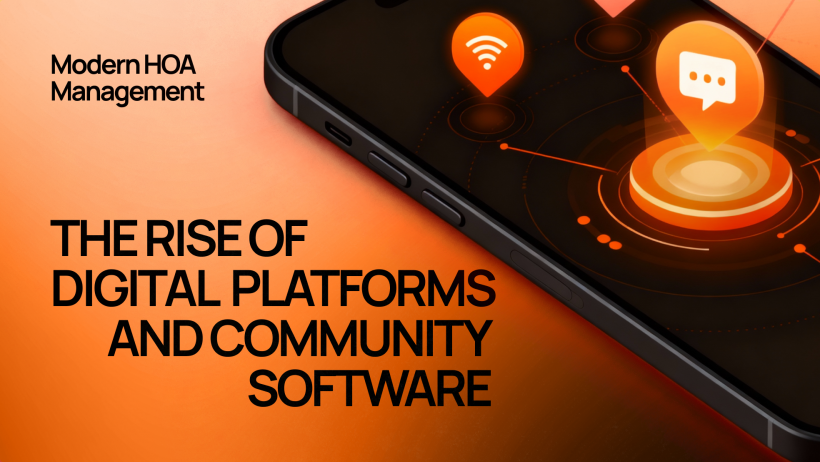According to Allied Market Research, the global homeowners association (HOA) management software market is expected to reach $18.0 billion by 2032, at a CAGR of 7.1%. This is unsurprising, given that the global approach to managing residential communities is shifting away from conservatism, gradually abandoning Excel spreadsheets and manual request processing in favor of more advanced, streamlined digital solutions. Below, as a company specializing in the HOA management software development, we’ll share our insights on this matter.
The Shift Toward Digital HOA Management
Previously, HOA management relied on paperwork, in-person meetings, and phone calls. However, today, people expect digital services, which are much faster, as well as more transparent and convenient.
Furthermore, as modern residential communities become more sophisticated, enriching with an ever-increasing number of buildings, services, contractors, and communication channels, maintaining records in paper format or Excel spreadsheets is becoming increasingly irrational. This is why resident portal software must simultaneously address two objectives: an operational one (to simplify management) and a social one (to build trust with residents and ensure digital community engagement).
Indeed, considering that property management automation reduces the workload of managers, minimizes the risk of errors, and speeds up request processing, the need for specialized software becomes obvious. Below, we will explore its advantages in more detail and explain the minimum set of features it should have.
Benefits of HOA Management Software
.png)
The benefits of the most advanced HOA payment processing platforms extend far beyond automation. Specifically, they can provide:
- Streamlined communication with residents. Modern HOA platforms can combine notifications, news, forums, chats, and surveys in one place, eliminating information clutter and ensuring that every resident receives up-to-date information. Furthermore, if these platforms are available in a mobile format, they allow residents to submit repair requests, vote on initiatives, and track statuses online from their smartphones. This reduces conflicts and fosters genuine trust in the board.
- Automated financial tracking and reporting. Financial flows’ transparency is another aspect that HOA financial management systems can provide. Specifically, they automatically track payments, control budgets, and generate reports, thus eliminating manual errors and simplifying auditing. Furthermore, many of these systems seamlessly integrate with banking systems, making paying dues and monitoring receipts more convenient than ever before.
- Enhanced transparency in board decisions. HOA board management tools can create a new management culture that residents fully control. This is achieved through decisions that are immediately available for review after they are made. These platforms also often enable storing and publicating meeting minutes, as well as reports and voting results, which ultimately eliminates the possibility of manipulation.
If you would like to achieve all of the above benefits for your organization in a custom HOA management solution, feel free to contact us, and we'll implement it most cost-effectively.
Exploring Digital HOA Platforms
Although there are many off-the-shelf HOA solutions today, when choosing HOA software vendor, you’ll find that not all of them will be equally effective for your needs. For example, communities most often look for a HOA communication tools, a payment gateway, contractor management functionality, automated HOA reporting tools, as well as alert systems and resource reservations. Such platforms may also include separate mobile apps for HOA members with online voting capabilities and user activity analytics modules.
Another sought-after feature is the ability to integrate with third-party systems. In particular, it makes sense to consider an HOA platform that seamlessly transfers data to accounting, CRM, and property management systems. This eliminates the risk of data duplication by providing a single point of access to all operations.
Finally, a few words about what a secure HOA communication system means: since such platforms handle residents' personal and financial data, encryption, multi-factor authentication, and role-based access control are must-have. You'll also need to check compliance with local data protection laws and presence of regular security audits. At the same time, if we talk about custom development, your tech team should rely on a Zero Trust architecture and implement automated backups to eliminate the risk of data loss.
HOA Self-Service Portals for Residents
Today’s residents are increasingly seeking autonomy, which means being able to handle everyday issues online without having to wait for a manager. This is why self-service online resident portals are becoming an integral component of most HOA platforms. Essentially, these are digital environments where every homeowner can view their account status, pay their fees, submit repair requests, vote, learn about the latest board decisions, and more.
Such portals also provide 24/7 access to meeting schedules, maintenance request statuses, payment tools, and more, which can be crucial for distributed communities where physical interaction is limited. At the same time, developers of such solutions must maintain the intuitiveness and accessibility of the user interface so that residents of any skill level can seamlessly interact with the system with a single tap.
Finally, it's worth noting that the automation provided by HOA self-service portals reduces the workload of managers and minimizes operational costs, primarily through automated notifications, payment reminders, and reports. These portals can also automatically create queues of service requests and synchronize financial transactions with accounting without manual input.
Community Management Software Solutions
Community management software is often capable of consolidating CRM functionality, as well as billing, communications, and analytics without third-party integrations, thereby creating a single control center where data on all residents and contractors is stored. Essentially, this "control center" is presented as an interface where, instead of multiple tables and documents in different formats, all balances, application statuses, upcoming meetings, scheduled repairs, etc., are displayed. This allows communities to instantly respond to requests and, even more importantly, proactively manage the situation without the risk of data loss.
Another criterion for the best HOA management software is its scalability. Indeed, while small communities require simplicity and accessibility, larger communities typically look for integration and flexibility in such systems. That's why it makes sense to consider platforms that allow you to start with basic functionality and expand the system as your community grows, adding analytics modules, contractor automation, new integrations, and so on.
It's also worth mentioning that since each community is unique, flexibility and process customization are considered mandatory requirements for HOA platforms. In practice, this typically means being able to tailor notification, online HOA payments, and reporting logic to specific processes.
Choosing the Right HOA Technology
When choosing HOA technology solutions, it's important to consider their applicability to your specific business scenario, integration capabilities, security requirements, and, of course, end-user convenience. Otherwise, you risk costly rework and data loss. Therefore, when searching for a SaaS solution, it makes sense to look for open-source options that support APIs, scale well, and meet data protection standards like GDPR or CCPA.
Also, before implementation, you should audit your current processes and determine which tasks require automation, which data is already stored in systems, and which is still represented by paper documentation. Another important aspect to evaluate is the system's ability to fit into the existing IT landscape. Finally, you should plan for employee training and communication with residents to minimize the risk of resistance.
At the same time, in addition to ready-made SaaS solutions, it's also worth considering custom development. The second option is suitable if the capabilities offered by off-the-shelf solutions limit your automation ability and integration with third-party systems. This way, you’ll be able to consider the specifics of a particular HOA, provide the necessary digital community management customization, and ensure long-term scalability. A hybrid approach is also always possible, through the implementation of a ready-made cloud-based HOA software and its subsequent expansion with custom digital tools for HOA boards tailored to your specific business needs.
Ultimately, if you have a reliable technical contractor, you can always contact them to obtain an objective assessment of the effectiveness of each of the above options and select the one that will bring you the highest ROI.

The Future of Digital Community Management

Over the past few years, HOA systems have evolved from specialized administrative tools into comprehensive digital solutions integrating financial, technical, and communications processes. This is achieved primarily through mobility, IoT integration, the implementation of AI algorithms (aimed at predicting resident needs, prioritizing service requests, analyzing budgets, identifying potential conflicts of interest, etc.), and document automation. Furthermore, there are trends on cloud-based property management (it ensures increased data availability and security) and personalization (it’s achieved through adapting interfaces and functionality to the needs of specific communities).
On the other hand, such technological advancement also forces developers to take a more conscious approach to creating user experiences – the more complex a software solution, the higher the risk of user resistance. This should also indirectly influence community policymakers – they should introduce digital culture, training residents and board members and explaining the benefits of new interaction formats.
FAQ
How secure are online HOA self-service portals?
Modern portals typically feature multi-level authentication, data encryption, role-based access control, data replication, and activity monitoring to prevent leaks. However, if you choose ready-made solutions, you'll need to ensure they meet international security standards such as GDPR, ISO 27001, and SOC 2.
Can HOA management software integrate with existing accounting systems?
Yes, the vast majority of such solutions seamlessly integrate with accounting and ERP systems, from standard ones like QuickBooks to custom ones, thereby eliminating the need for manual data entry and improving HOA reporting and analytics accuracy. At the same time, if you choose custom development, your technical team can offer any API integrations tailored to specific processes and reporting formats.
What is the average cost of adopting a digital HOA platform?
The cost of implementation depends on the scale of the community, the number of users, and the level of customization. This aspect is also influenced by whether you choose a ready-made SaaS solution (usually, HOA software pricing is limited to $100-500 per month) or custom development. The latter option requires a higher initial investment. Still, at the same time, you gain unprecedented flexibility and a long-term return on investment (in our experience, ROI is achieved within 12-18 months due to reduced administrative costs and increased communication efficiency).
Do smaller communities benefit from community management software?
Yes, because for smaller communities, the automation provided by HOA accounting and billing apps provides transparency, budget control, and a reduced workload for the board.
How do digital tools improve homeowner engagement?
Digital HOA platforms create a new level of resident engagement, allowing them to participate in governance, understand how their funds are being spent, vote, and receive feedback.
Are mobile apps replacing traditional HOA communication methods?
Yes, HOA mobile apps are gradually replacing paper notifications, newsletters, and offline meetings, as all these tasks can now be performed from anywhere, with a single click. At the same time, in many cases, a hybrid approach makes sense, so that mobile property management apps complement rather than replace other communication channels – this will help communities accommodate the needs of all generations.
What are the most common challenges during HOA software implementation?
The main difficulties of software for condo associations relate to resistance to change, data migration, and user adoption – which is why we recommend implementing such systems in stages, from basic functions to more advanced ones, with training and support throughout the onboarding period.

